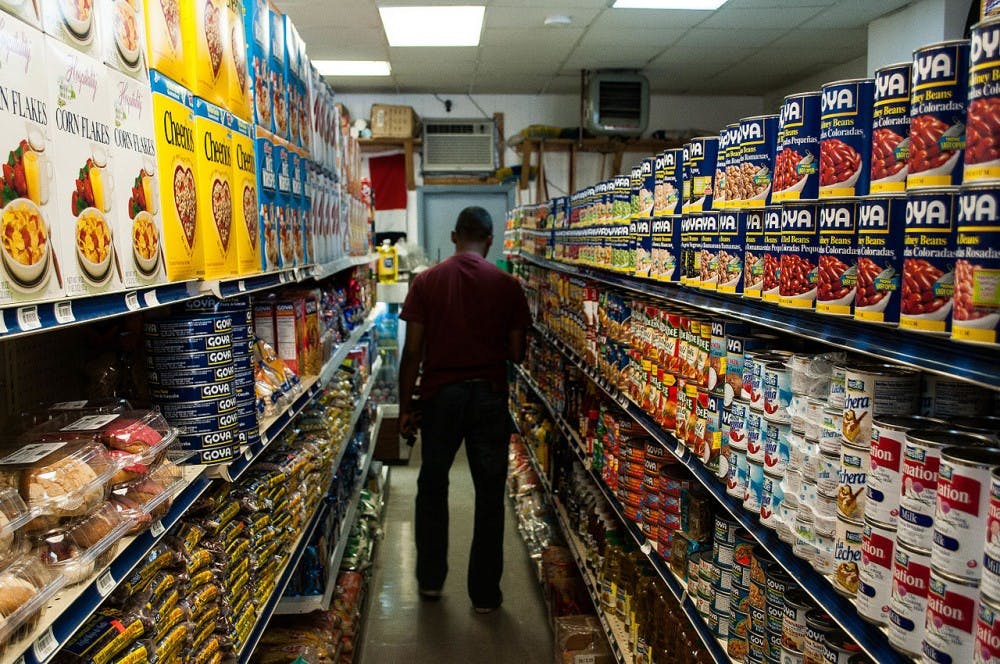Sometimes what’s on your plate might be difficult to swallow. Recognizing the individual’s participation in an exploitative and unjust food system is not easy, and finding constructive ways to change the system requires creativity. Common ways to address the consumer guilt of participating in a broken, conventional food system often turn into attempts to be a conscious consumer, a problematic movement led by rich white folk.
The responsibility for our food system shouldn’t lie in our purchasing choices alone. This limits the accessibility of participating in rebuilding food in the modern world and perpetuates white supremacy in deciding what food is best for our society.
When we speak about just, sustainable food, we are talking about dismantling injustice in ways other than making the choice to buy organic food over conventional products or shopping at Whole Foods instead of Giant. When we ask for real food, we are asking for food that combats the racism it was built on.
The connection between food and racism might not be obvious at first glance, but this idea plays out in every part of the system our food touches.
Our American food system was built on the backs of slaves and immigrant workers. Black slaves were brought to this country centuries ago to provide free labor in profitable plantation systems. Black Americans were not allowed to keep the land they worked, nor any of the profits made from their labor. This is how our country came to prosper, and the effects of these racist policies are felt today.
The story of Baltimore’s racist urban planning policy is obvious in the segregation that continues today. The districts that were redlined are the ones with high rates of concentrated poverty and majority black populations. They are also the ones swamped with corner stores and fast food restaurants, with no access to healthy food. According to the Food Research and Action Center, “children who experienced poverty by two years of age were 1.66 times more likely to be obese by 15.5 years of age than children who did not experience early poverty.” Our city is economically and racially segregated; our food follows the same patterns.
Migrant workers in the U.S. are underpaid and overworked and face continuous threats of violence and deportation from the current administration, despite the fact that their exploitation is crucial to getting food to our plates. Given the recent anniversary of Trump’s election, it is worth considering how his xenophobic policies directly impact food systems workers within the country, both on farms and in food production.
The environmental impact of agricultural practices disproportionately affects people of color. On a microscopic scale, toxic agricultural waste is redirected to communities of color, and migrant workers are often those working in the unsafe conditions of concentrated animal feeding operations. On a macroscopic scale, climate change, to which unsustainable agricultural practices contribute significantly, remains unaddressed. Yet people of color are facing climate-caused crises right now: food shortages caused by increased frequency of natural disasters and drought.
It is easy to dismiss the injustices of our food system as disconnected from these institutions. But issues of fair wages, corporate consolidation and violence go unnoticed precisely because of institutionalized racism. We are able to ignore these issues because of an intentional lack of attention to the issues that affect people of color both in this country and globally.
And so we look at food through the lens of social justice. Because food is fundamental, it is the story of our collective cultures, of healing, of liberation through independently growing food. Food is in everything and touches so much. In our industrial food system, the ugly truth of what our food touches before it reaches our plate is one that corporations have worked to conceal from us through a scheme of marketing diversification, even as they continue to consolidate and overtake the market in an oligopolistic way.
But the food system doesn’t have to look like this. For something so fundamental to our basic livelihood, we should be able to claim power over it through democracy. Food can bring us justice racially, economically and socially. The fight for a fair food future is a fight for the representation of unheard voices in deciding the trajectory of health for their bodies and the Earth. We are fighting for food that truly nourishes our producers, our animals, our planet and ourselves. We believe that we are the real food generation — the ones that can fight the injustices that have resulted in the disproportional sickness of people of color, and we can win a sustainable, just and democratic food system.
Divya Korada is a junior International Studies and political science major from Edison, N.J. Clarissa Chen is a junior public health and GECS major. She is from Bloomington, Ind.





